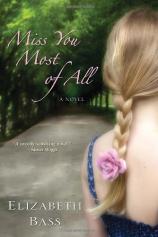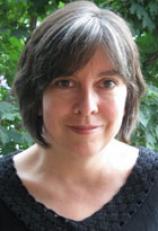Interview: May 28, 2010
Familial relationships take center stage in Elizabeth Bass’s debut work of fiction, MISS YOU MOST OF ALL, which explores the dynamic between two sisters who --- upon transforming their family farm into an agriculturally-minded bed and breakfast --- are forced to take in their estranged younger stepsister. In this interview with Bookreporter.com’s Terry Miller Shannon, Bass explains how writing this novel acted as a form of homecoming and reveals which of the main characters she feels she can identify with the most. She also elaborates on her use of humor in her work, shares a list of some of her favorite classic “comfort” movies, and talks about her next project, WHEREVER GRACE IS NEEDED.
Bookreporter.com: What was your original inspiration for writing MISS YOU MOST OF ALL?
Elizabeth Bass: I got the idea from reading an article on agritourism. I grew up in the country, so a farm never seemed like a vacation destination to me. I started wondering what kind of person would be interested in spending her vacation learning about fertilizer, and what would cause a farm to start taking in guests in the first place. And of course, I began to imagine all the things that could go wrong.
BRC: From the details about farming, it certainly seems that you have had intimate experience living on or running a farm. Is this the case? If so, please tell us about it. If not, what kind of research did you have to undertake to write MISS YOU MOST OF ALL?
EB: I grew up in a rural area in Texas, but not on a farm like the Sassy Spinster Farm. My father had been a farmer but had gone bust before I was born, so I always was aware of the precarious nature of that life. We had cows and a kitchen garden, but nothing close to the serious operation the characters in my book are running. For details in the book, I relied heavily on reading about CSA farms on the Internet. Many have websites, and some owners even write blogs, which were very informative.
BRC: These characters, particularly the sisters, feel so true to life that I expect to meet one of them behind a stand at the local farmer's market. Which character came to you first, and how did they develop from there?
EB: The character who came to me first was Heidi, the stepsister, because I originally envisioned writing a humorous fish-out-water story. But when I started imagining the two sisters who were running the farm, and thinking of the situation they might find themselves in, I realized I had a very different type of book on my hands.
BRC: With which of the sisters in this book --- Rue, Laura and Heidi --- do you most strongly identify?
EB: To tell the truth, I identify with all the sisters in the book --- especially their flaws. The character in the story who I feel is closest to my own experience, however, is the daughter, Erica. The town where I grew up was so tiny, our school district only went up to eighth grade. My entire elementary school class had 11 kids! I remember vividly taking swimming lessons at age of eight in a nearby town --- which maybe had a population of 10,000, tops --- and feeling as if the children there were so much more sophisticated than I was. Some of the girls were already wearing lip gloss. I was overwhelmed.
BRC: Fred made me laugh. Is he based on a real-life chicken?
EB: Someone recently told me that Fred reminded her of an ex-boyfriend! He’s sort of the Charlie Brown’s Christmas tree of chickens. I have never owned a chicken, but I’ve always been intrigued by them. I’ve encountered stories of people becoming very attached to their chickens, and I think a lot of farm people --- even the most realistic --- will eventually encounter a certain animal that they bond with.
BRC: Rue and Laura run the Sassy Spinster Farm, a bed and breakfast that gives guests a taste of what farm life is like. Have you ever personally experienced this type of vacation?
EB: Never! I remember vividly what it was like to weed a garden under a hot summer sun and to spend afternoons picking, peeling, or preserving. (Even the smallest garden always seems to result in a surplus of something.) My dream destinations tend to be places where the chances of running into biting insects or snakes are slim.
BRC: I believe readers of this book will find themselves laughing out loud at times, while at other moments they will be swallowing huge lumps in their throats. As a writer, do you find it difficult to switch gears emotionally? Is it easier for you to write humorous scenes rather than poignant ones, or vice versa --- or are they equally challenging?
EB: Humor is my default mode in writing. I think I naturally tend to seek out the humorous angle in a situation, and the characters who make me laugh are the ones that reel me in and draw me to the computer to write. (When there’s a sad scene to tackle, my closets will suddenly need cleaning.) What’s hard is to discern whether something I find amusing is something others would laugh at, too. I usually end up cutting a lot of nonsense. There’s a broad spectrum of senses of humor, whereas I feel that poignant situations tend to be more universal, so I feel more confident that what brings a lump to my throat will have the same effect on readers.
BRC: Movies --- both old classics and new favorites --- figure prominently in your plot. Which is your go-to film when you need comfort?
EB: I am a pathetic classic movie addict. There are a bunch, such as The Apartment and The Shop Around the Corner, that I could recite from beginning to end. I have comfort films for every mood, and they tend to change from decade to decade. A few of my perennial favorites are Now, Voyager (or anything with Bette Davis), Pillow Talk, Stage Fright, The Best Years of Our Lives, Persuasion, The Painted Veil and The Best of Everything.
BRC: How did you end up in Montreal after growing up in rural Texas ? Do you feel that setting this book in Texas is a way to revisit your past? What do you miss most about the Lone Star State?
EB: I grew up rural, but I dreamed urban. Even while I loved roaming around the countryside and being around lots of critters, I used to watch movies and television shows set in cities and think that was the life. I wanted to live in a place where there was always something going on and the neighbor across the hall would drop in. Now, of course, I really see the benefits of occasional calm and people calling before they come over. When I visit home in Texas, I’m always struck by how peaceful it is to wake up in a place where there’s no traffic noise, just the sound of birds.
I tend to set books in places I know well, so I’ve returned to Texas a lot in fiction, and it seemed a natural for a book set on a farm. The town of Sweetgum is very much like my hometown --- a school, a store and several churches.
BRC: Please tell us about the path to publication for MISS YOU MOST OF ALL. How many years ago did you first think of it? How long did it take for you to write it?
EB: MISS YOU MOST OF ALL began life about four years ago. I wrote several chapters and showed them to my agent, who liked them, but I didn’t have a lot of confidence in the story because it was very different from the more humorous books I’d been writing. I put the chapters away but started working on the book again during a period when I was moving around quite a bit, first from Portland to Ottawa, then to Montreal. Amidst the upheavals, it was comforting to return to the world of Texas, which I knew so well.
BRC: I wonder how you managed to weave together several threads about different characters so seamlessly into one story. Did you outline the plot --- or was it more of an organic process, with the story leading you rather than you leading the story?
EB: I outline, although there are always times during writing when the story starts to develop a mind of its own and parts of the outline have to be scrapped. And occasionally during the course of writing the book, my views of certain characters change. For instance, I had originally planned for the character of Leanne Dench, Erica’s father’s girlfriend, to be more talked about than seen. But I enjoyed her so much that she worked herself into the action more. I became fonder of her than I expected to.
BRC: What is your writing process like? Do you write daily?
EB: I try to write every day, but my output is more spastic than I would like it to be. The best time for me to write is early morning, before I have a chance to look at the newspaper or become distracted by email or other work. I also tend to write a scene by hand first, with a pencil in a spiral notebook, and then rewrite those pages as I type them into the computer, so that by the time I have a rough draft, it feels more like a second draft.
BRC: Who are your favorite authors or other inspirations for your creativity?
EB: The writer who most inspired me to write was probably Anne Tyler, because I always loved her voice, her characters, and the very specific world she creates in her books. I also find inspiration in movies and plays, and in stories I read in newspapers and hear just talking to people. I took a few cross-country train trips in my 20s, and I’ve been mining from the tales I heard from fellow passengers ever since.
BRC: I just have to ask after reading your acknowledgements: What's the deal with “Pink Lady and Jeff”? Are you pro or con?
EB: Pro! “Pink Lady and Jeff” felt like the last gasp of the variety shows that had been popular in the ’70s, all of which I watched religiously. It featured an unfunny comic paired with a cute Japanese singing duo who couldn’t speak English. I don’t think it lasted more than four episodes before it got cancelled. The amazing thing was that my editor at Kensington was the first person I ever ran into who remembered it! So we have that bond of shared pain.
BRC: Are you currently working on a new novel? If so, can you give us any details about it?
EB: I’m currently finishing a novel titled WHEREVER GRACE IS NEEDED, which should come out in 2011. It’s about a woman who returns home temporarily to take care of her father after he’s been in an accident, and who finds herself getting more involved in her new surroundings than she’d expected.
• Click here now to buy this book from Amazon.
© Copyright 1996-2011, Bookreporter.com. All rights reserved.




